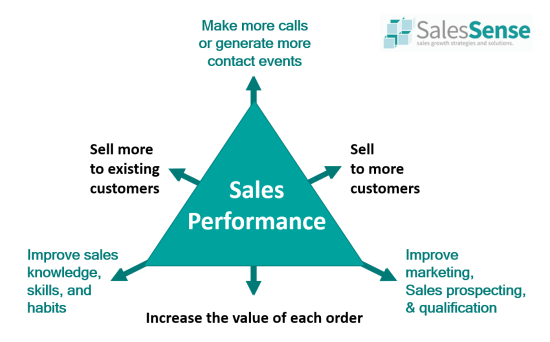Use these sales management tools to optimise performance and maximise results.

Sales leadership rests on mastery of several skills and a range of sales management tools. Charisma and a bold vision alone are not enough to motivate sales personalities. Leaders have to lead where people want to follow. People do things for their own reasons. There are at least ten distinct sales management tools that influence behaviour and work regardless of a leader's personal power.
Effective use of sales performance management tools has a significant impact on the actions of salespeople and the results they achieve. These powerful management levers mostly have familiar labels – change agents, appraisals, coaching, incentives, sales process, training, providing content, providing intelligence, assignment alignment, and inspiring vision.
Ten Sales Management Tools
Change Agents

Personality, character, experience, and circumstances vary significantly amongst customer-facing staff. Some individuals are predisposed to embrace change or even actively seek it. The behaviours and practices of the more influential members of this group have a considerable effect on the behaviours and practices of those around them.
Such people might be labelled ‘change agents’. They can be identified and their proclivity harnessed in pursuit of the desired change. Leaders sometimes leverage this means of effecting change informally, through a well-developed internal network. Formal use of change agents in management is less common.
Appraisals
Almost everyone uses some sort of appraisal system. Most systems were put in place to underpin the process of firing people which in most European countries relies on documented evidence of performance issues. Failure to prove non-performance can allow disgruntled employees to challenge dismissal decisions. A successful challenge results in penalties or even enforced reinstatement. Poor handling of these human resource issues can be very expensive.
In light of this connection between the appraisal process and discipline, it seems unsurprising that appraisals are widely disliked by managers and employees alike. Yet appraisals that are used as a means to motivate and support development can make a significant contribution to an organisation’s effectiveness.
Equally, appraisals can be a means of changing behaviour. People pay attention to whatever is measured.
Coaching
Senior executives expect managers to coach their people. Usually, a prerequisite of getting a management position is the ability to do the job that is to be done by direct reports. So why don’t most managers spend more time coaching their people to adopt the right behaviours?
First and foremost, managers must ensure that targets are met. The numbers always come first. Coaching focuses on developing capability first. For coaching, the numbers come later so coaching interferes with the achievement of a manager’s primary objective.
Managers who are ahead of their sales target have the luxury of being able to focus on secondary priorities. Those who have yet to secure the necessary figures, inevitably focus on the operational issues associated with opportunities that have yet to be closed. The numbers come first and this is as it should be.
In any one-on-one exchange with staff, the operational issues are dealt with first and any intended coaching is squeezed to the end of the exchange, which means it most often never happens.
Coaching, as opposed to teaching, is about helping students find answers for themselves. People’s own ideas are always more likely to be acted upon than anyone else’s. Coaching success depends on taking the time and trouble to understand the person being coached, and the patience to coax out the right thoughts, ideas, and commitments.
Among sales management tools, coaching is routinely overlooked or dismissed due to the cost of hiring external resources yet, it is possible to set up peer coaching programmes that draw on the capabilities of senior team members.
Incentives
Those whose income has a significant performance-based element tend to follow the direction of their compensation plan more than the instructions or guidance of their manager.
As the proportion of performance-based compensation goes up, the more accentuated the behaviour.
Commission-only salespeople have no choice but to make very polarised decisions about their use of time.
Those on a high base salary with only a small element of performance-based pay, tend to behave according to what’s best for the team and maintaining their position in it.
Sales compensation planning and plan complexity tend to relate to the size of the organisation and the number of departments or product interests vying for the mind-share.
The behavioural consequences of performance-based compensation can have unintended results even in small organisations with simple measurement criteria.
Sales Process
It is in the nature of those who sell for a living to resist structure or anything that curtails freedom to operate their own way, yet having a clear framework of connected processes that reflect the course of a customers buying process and facilitate progress measurement, is an underutilised means of influencing behaviour.
Training
Product training together with testing is generally given significant attention in organisations selling complex solutions. By comparison, training in skills and methods gets sporadic and infrequent attention. The reason for this discrepancy relates to proof. Those who lack a thorough knowledge of their products or solutions make the organisation seem incompetent or inadequate. The threat to status is blatant and difficult to ignore.
Apart from the obvious need for good interpersonal communication skills, the possession of sales skills and the use of methods is much more difficult to measure. Proof that training has a positive effect on results is expensive to obtain. For training to have a certain effect, more time needs to be spent establishing what to train and how.
As for coaching, senior executives expect managers to take care of training through interaction on the job or through direction. This expectation suffers from the same priority conflict described for coaching. As a result, investment in developing skills and methods is often squeezed between a manager's responsibility for short-term results and a corresponding lack of adequate budgeting.
Sales training receives more attention when a team or business is ahead of its target; when executives are confident that financial objectives are being met, and when there is time to draw breath and think of the future. So training is often put off until it is least needed.
Providing Content
Pathos, ethos, and logos are the keys to persuasion claimed Aristotle. Ethos refers to the credibility of the information source. Few salespeople are considered thought leaders in their industry or market however, this personal authority isn’t necessary if the salesperson can quote those who have it.
Those organisations that consistently provide fresh authoritative and credible content can raise the status of the people who propagate it. Providing content steers behaviour and impacts results.
Providing Intelligence
It’s important to distinguish between propaganda and intelligence. When sellers come to believe their organisation’s propaganda they repeat it. This tends to damage credibility. Accurate intelligence, both negative and positive, equips people to enhance their credibility with customers and prospects. The degree of propaganda and intelligence disseminated affects behaviour and results.
Assignment Alignment
Intrinsic motivator assessments reveal wide variation amongst salespeople. From an intrinsic standpoint, money is seldom what drives sellers. In our own research, we have labelled eleven distinct motivational factors and used them to assess the intrinsic motivational profile of sellers.
The labels are Promotion, Achievement, Money, Relationships, Autonomy, Life Balance, Safety, Challenge, Duty, Recognition, and Interest.
People are better at doing things they like doing.
Understanding intrinsic motivators offers the opportunity of distributing account, territory, and role assignments intelligently. For instance, Safety/Duty led salespeople make better account managers than Autonomy/Challenge led staff. Compensation plans can be tuned to motivate individuals rather than treating all sellers as if they were motivated by the same things and to the same extent.
Inspiring Vision
Perhaps having a universal impact is beyond reasonable expectations, yet those who can communicate a vision that chimes with people, a view of the future that transcends mere survival and instils listeners with a stronger sense of purpose, at least for a time, can inspire people to make a greater and more coordinated effort. At the heart of such inspiration is the perception of a worthwhile purpose. Many seek to inspire yet few create such inspiring visions. Is it the vision that chimes or the delivery? More likely it is some combination of both. Perception and belief rule the heart, no matter how they are stirred.
It’s time to take the blinkers off and realise that behaviour and the resulting performance is a factor of the management and the organisation's ability to create the right environment. Leaders need to make the most of these ten sales management tools to influence individual actions and team results.
Article by Clive Miller
If you need to improve sales performance management or use better sales management tools to change sales behaviour, we can help. Telephone +44 (0)1392 851500. We will be pleased to learn about your needs or talk through some options. Alternatively, Send an email to custserv@salessense.co.uk for a prompt reply or use the contact form here.












